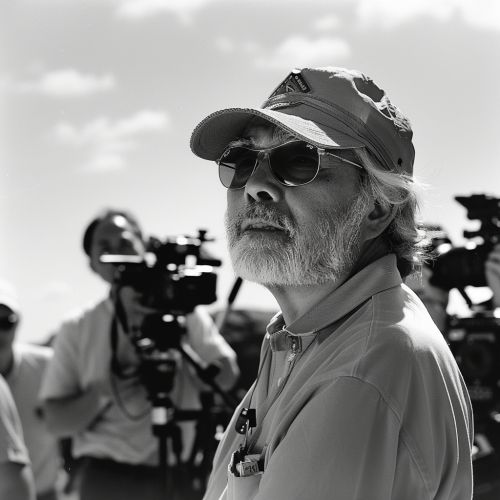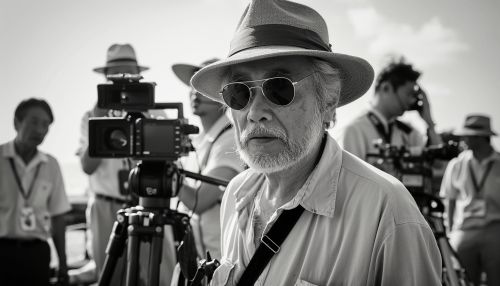Akira Kurosawa
Early Life and Education
Akira Kurosawa was born on March 23, 1910, in Tokyo, Japan. He was the youngest of eight children in a family with a samurai lineage. His father, Isamu, was an army officer and a director of a junior high school, while his mother, Shima, came from a merchant family. Kurosawa's early education was influenced by his father's interest in Western culture, which included cinema. This exposure to Western films and literature played a significant role in shaping Kurosawa's artistic vision.
Kurosawa attended the Doshisha Elementary School and later the Keika Middle School. His early interest in art led him to the Tokyo School of Fine Arts, where he studied painting. Although he initially aspired to be a painter, the economic difficulties of the Great Depression forced him to reconsider his career path. In 1936, Kurosawa joined the P.C.L. (Photo Chemical Laboratories), which later became Toho Studios, as an assistant director.
Career Beginnings
Kurosawa's early career in the film industry was marked by his work as an assistant director under Kajiro Yamamoto, a prominent filmmaker of the time. Yamamoto mentored Kurosawa and provided him with valuable experience in various aspects of filmmaking. Kurosawa's first significant contribution as a screenwriter came with the film "Horse" (1941), directed by Yamamoto.
In 1943, Kurosawa made his directorial debut with the film "Sanshiro Sugata," a judo saga based on a novel by Tsuneo Tomita. The film was well-received and established Kurosawa as a promising new director. His subsequent films, "The Most Beautiful" (1944) and "Sanshiro Sugata Part II" (1945), further solidified his reputation.
Post-War Period and International Recognition
The end of World War II marked a turning point in Kurosawa's career. His film "Drunken Angel" (1948), featuring Toshiro Mifune, was a critical success and marked the beginning of a long and fruitful collaboration between the director and the actor. Kurosawa's next film, "Stray Dog" (1949), was a noir-inspired crime drama that showcased his growing mastery of the medium.
Kurosawa's international breakthrough came with the release of "Rashomon" (1950), a film that explored the subjective nature of truth through multiple perspectives of a single event. "Rashomon" won the Golden Lion at the Venice Film Festival and an Academy Honorary Award, bringing Kurosawa and Japanese cinema to global attention.


The Golden Age
The 1950s and 1960s are often regarded as the golden age of Kurosawa's career. During this period, he directed some of his most acclaimed films, including "Ikiru" (1952), "Seven Samurai" (1954), and "Throne of Blood" (1957). "Ikiru" is a poignant exploration of the meaning of life and death, while "Seven Samurai" is an epic tale of honor and sacrifice that has influenced countless filmmakers worldwide.
"Throne of Blood," an adaptation of Shakespeare's "Macbeth," demonstrated Kurosawa's ability to blend Japanese cultural elements with Western literary classics. His other notable films from this period include "The Hidden Fortress" (1958), which inspired George Lucas's "Star Wars," and "Yojimbo" (1961), which influenced the Western genre.
Later Career and Challenges
The 1970s and 1980s were a period of both triumph and struggle for Kurosawa. Despite facing financial difficulties and health issues, he continued to create compelling films. "Dodes'ka-den" (1970) was a commercial failure, but "Dersu Uzala" (1975), a Soviet-Japanese co-production, won the Academy Award for Best Foreign Language Film.
Kurosawa's later works, such as "Kagemusha" (1980) and "Ran" (1985), were grand historical epics that showcased his enduring cinematic vision. "Ran," an adaptation of Shakespeare's "King Lear," is often regarded as one of his masterpieces. However, the production of these films was fraught with challenges, including funding issues and Kurosawa's declining health.
Legacy and Influence
Akira Kurosawa's influence on global cinema is profound and far-reaching. His innovative storytelling techniques, such as the use of weather to enhance mood and the incorporation of multiple perspectives, have been widely studied and emulated. Kurosawa's films have inspired numerous directors, including Martin Scorsese, Steven Spielberg, and Francis Ford Coppola.
Kurosawa's ability to blend Eastern and Western cultural elements has made his work accessible to audiences worldwide. His films often explore universal themes such as honor, duty, and the human condition, making them timeless and relevant across different cultures.
Personal Life
Kurosawa married Yoko Yaguchi, an actress, in 1945. The couple had two children, Hisao and Kazuko. Despite his demanding career, Kurosawa maintained a close relationship with his family. His son, Hisao, later became a film producer and worked on several of Kurosawa's projects.
Kurosawa was known for his meticulous attention to detail and his dedication to his craft. He was often described as a perfectionist, and his rigorous approach to filmmaking earned him the nickname "Tenno," meaning "Emperor."
Death and Posthumous Recognition
Akira Kurosawa passed away on September 6, 1998, at the age of 88. His death marked the end of an era in Japanese cinema, but his legacy continues to live on through his films and the countless filmmakers he has inspired.
Posthumously, Kurosawa has been honored with numerous awards and retrospectives. In 1999, the Akira Kurosawa Memorial Short Film Competition was established to encourage young filmmakers. His films continue to be studied in film schools around the world, and his influence remains a significant part of cinematic history.
